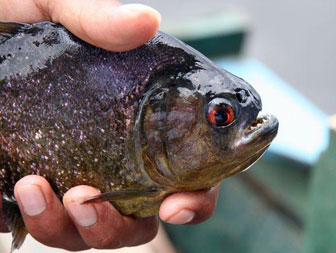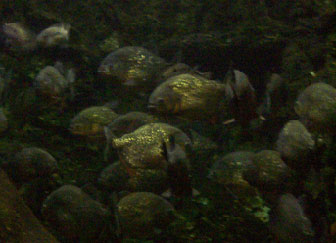Man-eating piranha are actually cowards
Man-eating piranha are actually cowards
mongabay.com
July 1, 2007
Despite their reputations as aggressive blood-thirsty carnivores, piranha schooling behavior is a defensive measure to protect against predators rather than an offensive hunting maneuver, reports new research presented at the Royal Society’s summer science exhibition in London. Piranhas face many predators in their Amazon habitat, including caiman, freshwater dolphins, and giant fish like the pirarucu or arapaima.
Piranha are popularly believed to form cooperative hunting groups that savagely attack larger animals, including livestock and even humans. The new research shows that instead, schooling seems to serve a defensive purpose.

|
“Piranhas have a fierce reputation, but through our research we are finding many of their behavioural choices are driven by their fear of being eaten,” said Anne Magurran of the University of St Andrews in Scotland. “Piranhas face a number of predators and are influenced by the availability of food and cover.”
Magurran says that piranha are actually omnivorous scavengers which mostly eat fish, plants and insects.
“One interesting aspect of our research in Amazonia’s flooded forests has been the seasonal differences in the piranhas’ behaviour,” explained Magurran. “During high water levels piranha can find food and protection easily. During the low water season, they are more at risk of attacks from predators such as dolphins and caiman.”

|
“We are showing that piranha schooling behaviour is tuned to the seasonal cycle of predation risk and food availability. We are also examining the changes in an individual piranha’s behaviour throughout its life-cycle, and the way in which these choices influence its chances of breeding and passing genes onto the next generation. Our investigation is giving us new insights into animal decision making in the wild.”
The Amazon is Earth’s largest river. The red-bellied piranha, the most notorious kind of dozens of species of piranha, is one of more than 3,000 species of fish found in the Amazon river basin.
The piranha’s fearsome reputation has led it to be banned from private ownership in a number of U.S. states.







